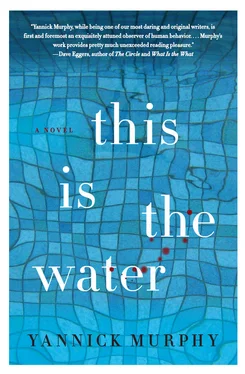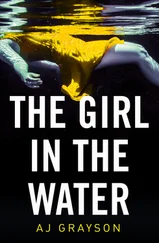This is Chris outside, the air on her wet blue jeans feeling good. She breathes in deeply — all the other fathers are watching her breathe. Her jeans fitting well over a small round rear, over thin legs. Her blond hair blonder now in the spring sunlight that makes water droplets on new grass glisten. Her breasts through her thin jacket almost visible, she isn’t wearing a bra, she doesn’t need to.
This is Dinah telling her daughter, Jessie, that in her next race she has to swim harder than she’s ever swum before. This is Jessie, a big girl whose practice suits stretch so tightly against her big belly that the polyester is almost see-through and one can see the white of her skin, telling her mother that she was singing, “This old man, he played one,” in her head while she raced. This is Dinah groaning, and saying, “Sing something else. Anything else. Sing some rock. Sing some AC/DC.” This is Dinah’s daughter saying she doesn’t know any rock or ADHD. This is Dinah saying, “It’s AC/DC.” Then saying, “Forget the song. Swim like a great white shark is after you.” Dinah’s daughter says, “But there isn’t a great white shark after me.” Dinah sighs, “Okay, if you drop your time I’ll give you a dollar for every second.” This is Dinah thinking how she cannot imagine how overweight Jessie would be if she did not swim. Dinah herself never did sports as a kid, and maybe if she had, she wouldn’t be fat like she is now, and maybe she would have friends, because all of the girls on the team seem to have friends. She has seen Jessie and her friends stopping at the wall between sets, talking to each other, laughing with each other, and splashing each other. She has seen them before practice huddled next to someone’s locker, showing each other their latest clothing purchase, the latest series book to read.
This is Dinah hoping her daughter Jessie doesn’t turn out to be a bumbler like her father, Joseph, a man Dinah married years ago because she thought he’d be a good father, which he is, but that was the only reason she married him. This is Dinah hoping her daughter doesn’t turn out to be like Dinah either, an overweight woman who has almost no friends and knows that she has almost no friends because she is critical of everyone else’s behavior and doesn’t understand why people can’t live by high moral standards and beliefs the way she always has. To Dinah, all things carry equal weight: Writing thank-you notes by hand to people who give you gifts ranks up there with not stealing from a store. Hanging up on a telemarketer is just as disrespectful and deplorable as cheating on a spouse. The few friends she has made over the years were always subject to her wrath when they made the slightest mistake in her eyes—“What? You keep in contact with old boyfriends? You might as well be having an affair with them!”—and they gradually stopped being her friend. That was also a mistake in Dinah’s eyes. If they were stronger people, they would see that she only made comments to help them become better people. Dinah knows she’s uptight, but doesn’t feel it’s right to deny that part of her. It would be like cheating on herself. Dinah’s husband is someone who always defends people like Annie, who don’t see the importance of following all the rules to a T, and he says that other mothers on the team, who are so uptight about doing everything the team asks of them, could learn from Annie’s more relaxed attitude.
It’s work for Dinah to drive Jessie forty-five minutes to the pool every day after school and sit and wait for the two-hour practice to be over, but in the long run she feels it’s the best gift she can give her daughter, like a get-out-of-jail-free card allowing her a disassociation from those twisted strands, those DNA, she inherited. Joseph is not especially handsome or smart or funny (he looks and acts goofy, always tripping on stairs and hitting his big square-shaped head on low doorways), but he has been a good father — always there to scoop their daughter up in his arms after a fall or to whisk her off to the doctor when need be, with a trip afterward to the ice cream parlor. But now that Jessie is older and doesn’t need that kind of fatherly attention anymore, Dinah feels she doesn’t need Joseph either. It’s as if both daughter and mother have outgrown him. To make matters worse, he’s losing his hearing, a condition caused by one too many deer hunting trips during which he’s shot a rifle off close to his ear, and as a result he’s yelling more because he can’t hear himself and thinks no one else can hear him either, so now Dinah’s yelling more too, trying to get him to understand everyday things like, “I’m taking Jessie to practice tomorrow, you make the dinner,” or “We’ll be home from practice late, be sure to take the roast out of the oven.” What’s made him even more annoying is that in the past few weeks he’s asked that she become some kind of a translator for him. When he talks to people and he can’t understand them, he turns to her and says, “What did they say?” His hearing is affecting his work as a real estate salesman, and he’s asked Dinah to come along with him a few times on a showing to help translate, but she’s now refusing to do it. A part of this has to do with time — being a manager of a prosthetic supplier, she has to work nine to five shipping off artificial arms and legs gently packed in Bubble Wrap and Styrofoam popcorn. A part of it has to do with her not wanting to have to take care of him in any way, and a part of it is her not wanting to have to meet rich couples touring high-end houses.
This is our killer. He drives fifteen minutes from the facility back to his home. He lives in an apartment he has lived in for twenty-five years. He has lines in his forehead so deep they could serve as stairs for a small doll. He has a washer and dryer in his kitchen, and when he eats meals he usually starts a load to wash or dry so that he has the sound of one of the machine’s drums turning to keep him company. As a killer, he has pride, he thinks, and does not want to be caught, the way so many experts think serial killers want to be. He is not like that careless killer out west all over the news who, as a matter of fact, made this killer want to kill again, just to prove it can be done right. It has been so many years since the last time. It makes him hungry again. Why shouldn’t I be able to once again see the light go out of a young woman’s eyes? he thinks. He thinks about Kim. He has been watching her for a few months. He thinks how Kim’s eyes, once she starts winning again, will be fever-bright with excitement and satisfaction. All he has to do is wait for that moment.
This is Kim at home at night watching butterfly technique videos and practicing, lying chest-down on the ottoman, trying to imitate the swimmer on the screen. The ottoman’s fabric has a coarse weave almost like a burlap sack and is uncomfortable on her skin, and her little sister, who is eight, keeps telling Kim how she swims butterfly and that maybe Kim should swim it more like she does, which doesn’t help Kim since her sister is like a rubber band and has such a flexible back she sometimes walks around the house in a backbend, reporting on what she sees on the ceiling, just for the fun of it.
While lying in bed that night, behind her curtain of ribbons, Kim thinks about how her dream for years has been to go to age groups, zones, sectionals, then junior nationals, then nationals, and then of course the Olympics. Things looked as if they were headed that way for a long time. Every season she improved her times, and every year she was going to more age-group meets and then zone meets, and sectionals, and even out west to California for juniors, but this season she’s slipping backward. She thinks she should get out of bed and sit at her desk and study for her history test tomorrow, but she’s too tired. Who cares, anyway, she wonders, if Caesar was a villain or just ambitious? “I care,” she responds, and she means it. She wants to keep getting all A’s in school, so she turns on the light, gets up, puts her robe on, and opens up her history book. When she falls asleep reading at one a.m., her pale blond hair, which she wishes were blonder, more the color of corn silk than what she thinks looks ghostlike and wispy, is spread across an illustration of Caesar crossing the Rubicon.
Читать дальше












